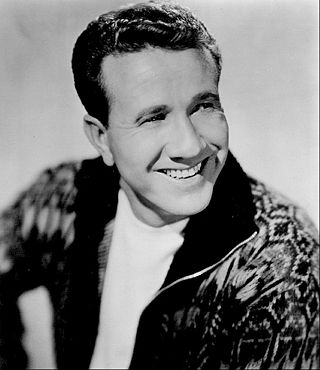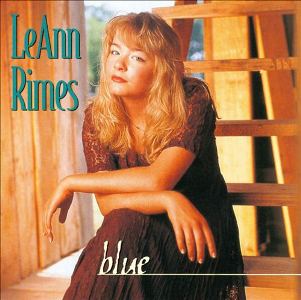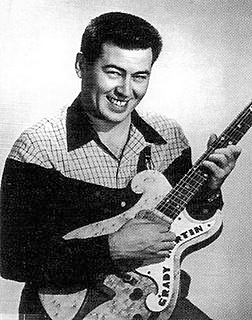Related Research Articles

Martin David Robinson, known professionally as Marty Robbins, was an American singer, songwriter, multi-instrumentalist, and NASCAR racing driver. Robbins was one of the most popular and successful country and western singers for most of his nearly four-decade career, which spanned from the late 1940s to the early 1980s. He was also an early outlaw country pioneer.

The Ventures are an American instrumental rock band formed in Tacoma, Washington, in 1958, by Don Wilson and Bob Bogle. The band, which was a quartet for most of its existence, helped to popularize the electric guitar across the world during the 1960s. While their popularity in the United States waned in the 1970s, the group remains especially revered in Japan, where they have toured regularly. The classic lineup of the band consisted of Wilson, Bogle, Nokie Edwards, and Mel Taylor (drums).
"If We Make It Through December" is a song written and recorded by American country music singer Merle Haggard and the Strangers. It was released in October 1973 as the lead single from the album Merle Haggard's Christmas Present, and was the title track on a non-Christmas album four months later. In the years since its release, "If We Make It Through December" — which, in addition to its Christmas motif, also uses themes of unemployment and loneliness — has become one of the trademark songs of Haggard's career.

Blue is the debut studio album by American country music singer LeAnn Rimes, released in the United States on July 9, 1996, by Curb Records. It peaked at number three on the US Billboard 200, and number one on the Top Country Albums chart.

Distortion and overdrive are forms of audio signal processing used to alter the sound of amplified electric musical instruments, usually by increasing their gain, producing a "fuzzy", "growling", or "gritty" tone. Distortion is most commonly used with the electric guitar, but may also be used with other electric instruments such as electric bass, electric piano, synthesizer and Hammond organ. Guitarists playing electric blues originally obtained an overdriven sound by turning up their vacuum tube-powered guitar amplifiers to high volumes, which caused the signal to distort. While overdriven tube amps are still used to obtain overdrive, especially in genres like blues and rockabilly, a number of other ways to produce distortion have been developed since the 1960s, such as distortion effect pedals. The growling tone of a distorted electric guitar is a key part of many genres, including blues and many rock music genres, notably hard rock, punk rock, hardcore punk, acid rock, and heavy metal music, while the use of distorted bass has been essential in a genre of hip hop music and alternative hip hop known as "SoundCloud rap".

"She's Got You" is a country song written by Hank Cochran and first recorded and released as a single by Patsy Cline. Musically the song is an upbeat jazz-pop song with country overtones to support it.

Thomas Grady Martin was an American session guitarist in country music and rockabilly.
"Funny How Time Slips Away" is a song written by Willie Nelson and first recorded by country singer Billy Walker. Walker's version was issued as a single by Columbia Records in June 1961 and peaked at number 23 on the Hot C&W Sides chart. The song has been featured in several live action films and television shows, such as in the first episode of the second season of AMC’s Better Call Saul and in the 2020 Netflix drama The Devil All the Time.
Devil Woman is a song written and recorded by American country music artist Marty Robbins. It was released in June 1962 as the first single and title track from the album Devil Woman. It was also Robbins' seventh single to reach number one on the country chart, spending eight weeks at the top spot. "Devil Woman" also crossed over onto the pop chart, peaking at number sixteen. Overseas, "Devil Woman" was Robbins' most successful single on the UK charts.
"Ruby Ann" is a song written by Lee Emerson, Rashima Bellamy and Roberta Bellamy, and recorded by American country music artist Marty Robbins. It was released in October 1962. "Ruby Ann" was the number one country follow-up to "Devil Woman." "Ruby Ann" spent a single week at number one and crossed over to the pop chart peaking at number eighteen. On the Easy Listening chart "Ruby Ann" went to number four.
"Ribbon of Darkness" is a song written by Gordon Lightfoot that was released in 1965 as a single by Marty Robbins. The song was Robbins' eleventh number one on the U.S. country singles chart, where it spent one week at the top and a total of nineteen weeks on the chart.
"El Paso City" is a song written and recorded by American country music artist Marty Robbins. It was released in March 1976 as the first single and title track from the album El Paso City. The song was Robbins' 15th number one on the U.S. country singles chart and his first since "My Woman, My Woman, My Wife" six years earlier. The single stayed at number one for two weeks and spent 11 weeks on the chart.
"You've Never Been This Far Before" is a song written and recorded by American country music artist Conway Twitty. It was released in July 1973 as the second single and title track from the album You've Never Been This Far Before.
"This Time I've Hurt Her More Than She Loves Me" is a song written by Earl Thomas Conley and Mary Larkin and recorded by American country music artist Conway Twitty. It was released in October 1975 as the first single from the album This Time I've Hurt Her More. The song was Twitty's fifteenth number one country single as a solo artist. The single stayed at number one for a single week and spent a total of ten weeks on the country chart.

"Big Iron" is a country ballad written and performed by Marty Robbins, originally released as an album track on Gunfighter Ballads and Trail Songs in September 1959, then as a single in February 1960 with the song "Saddle Tramp" as the B-side single. Members of the Western Writers of America chose it as one of the Top 100 Western songs of all time.

Let's Love While We Can is the thirty-seventh studio album by American pop singer Andy Williams, released in the U.K. in 1980 by CBS Records. For this project Williams eschews covering well-known pop hits and standards and relies mostly on original or lesser-known country songs.

Ralph Eugene Mooney was an American steel guitar player and songwriter, he was inducted into the Steel Guitar Hall of Fame in 1983. He was the original steel guitarist in Merle Haggard's band, The Strangers and Waylon Jennings's band, The Waylors.

Fuzz bass is a style of playing the electric bass or modifying its signal that produces a buzzy, distorted, overdriven sound, as the name implies. Overdriving a bass signal significantly changes the timbre, adds higher overtones (harmonics), increases the sustain, and, if the gain is turned up high enough, creates a "breaking up" sound characterized by a growling, buzzy tone.

The Maestro FZ-1 Fuzz-Tone was the first widely marketed fuzz distortion guitar and bass effect. Introduced in 1962, it achieved widespread popularity in 1965 after the Rolling Stones guitarist Keith Richards prominent use of the FZ-1 on the group's hit, "Satisfaction". Later in 1965 the design was slightly modified, designated as the model FZ1-1a. In the wake of the success of the Rolling Stones' "Satisfaction," numerous recordings mostly from 1960s garage rock and psychedelic acts featured Maestro Fuzz-Tones on guitars. More significant design changes made after 1967 resulted in different renditions of the Fuzz-Tone released over the years. In the 1990s Gibson re-issued FZ-1a, but it was later discontinued.
Glenn Snoddy was an engineer and recording studio owner in Nashville, Tennessee. He recorded major Country and Folk artists such as Johnny Cash and Hank Williams.
References
- 1 2 Whitburn, Joel (2008). Hot Country Songs 1944 to 2008. Record Research, Inc. p. 355. ISBN 978-0-89820-177-2.
- ↑ Whitburn, Joel (2004). The Billboard Book of Top 40 Hits: Eighth Edition. Record Research. p. 533.
- ↑ Kim, Michelle (24 May 2018). "Glenn Snoddy, Fuzz Pedal Inventor, Dead at 96". Pitchfork. Retrieved 2021-03-14.
- ↑ Halterman, Del (2009). Walk-Don't Run – The Story of the Ventures. Lulu.com. p. 81. ISBN 978-0-557-04051-3.
- ↑ Kosser, Michael (2006). How Nashville Became Music City USA. p. 49. ISBN 9780634098062.
- ↑ Diane Diekman (2012-02-15). Twentieth Century Drifter: The Life of Marty Robbins. p. 75. ISBN 9780252094200 . Retrieved 2016-09-26.
- ↑ Pike, Crotus (January 1968). "Sound Effects" (PDF). Beat Instrumental: 17. Retrieved August 16, 2023.
- ↑ "CHUM Hit Parade - March 20, 1961".
- ↑ "Marty Robbins Chart History (Hot Country Songs)". Billboard.
- ↑ "Marty Robbins Chart History (Hot 100)". Billboard.